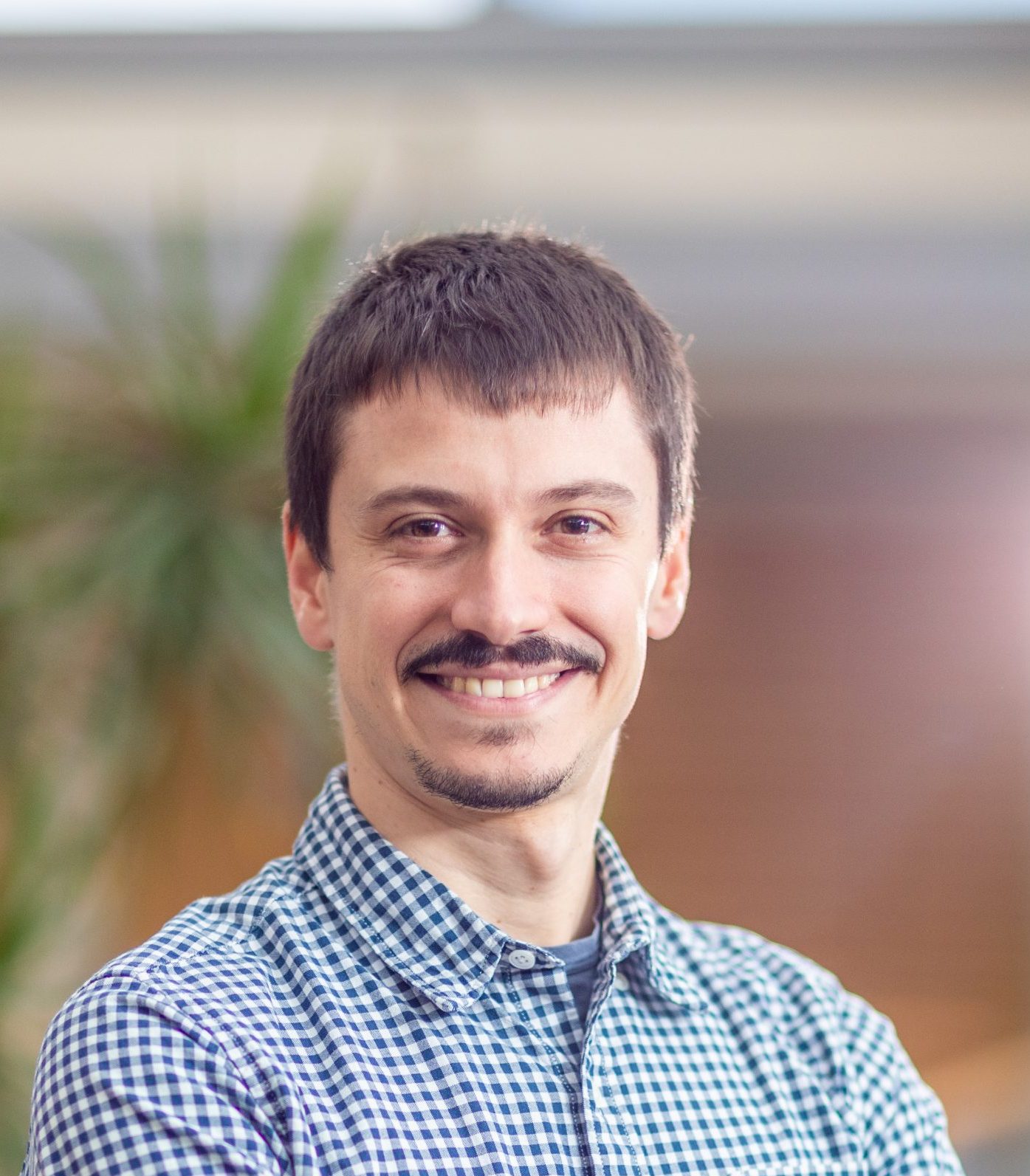
December 3, 2020, by Jo Gregory
Planet organic: an interview with Dr Mattia Silvi
Dr Mattia Silvi joined the Green Chemicals Beacon as a Nottingham Research Fellow in October 2019. Based in the GSK Carbon Neutral Laboratories for Sustainable Chemistry he directs a research group who are focused on the development of new organic chemistry reactions. In this interview, he talks to Jo Gregory about his research, his inspirations and how harnessing the potential of visible light will transform the way chemicals and pharmaceuticals are manufactured and secure a sustainable future.
Could you tell me a bit about your research career?
I obtained my BSc in Analytical Chemistry and my MSc in Organic Chemistry at the University Sapienza (Rome, Italy) publishing a thesis about the functionalisation of complex alkaloids for the development of novel catalysts for organic reactions. I then carried out my doctoral studies at the Institute of Chemical Research of Catalonia, ICIQ (Tarragona, Spain – 2011-2015) under the supervision of Prof. Paolo Melchiorre, where I developed a sincere interest in the field of photochemistry, the use of visible light to drive organic reactions. I spent part of my PhD research at the University of Michigan (Ann Arbor, MI, United States of America – 2014) in the group of Prof. John P. Wolfe working in the field of metal catalysis for the development of novel organic reactions. After obtaining my PhD, I was awarded a Marie Skłodowska-Curie European Individual Fellowship and moved to the University of Bristol (2016-2019) in the group of Prof. Varinder K. Aggarwal FRS, working in the fields of boron chemistry, photochemistry and the total synthesis of prostanoids with relevant biological activity. In 2019 I was awarded a Nottingham Research Fellowship to start my independent career at the University of Nottingham.
How would you explain your research to an ordinary person?
Our research focuses on organic chemistry. Although we are often unaware, organic chemistry surrounds us and is in our everyday life: medicines, agrochemicals and technological materials are all based on organic molecules that need to be prepared, studied and produced in small or large scale. In our lab, we routinely work on the discovery of novel organic reactions to produce the molecules of tomorrow.
Visible light is a clean, inexhaustible and ubiquitous form of energy that remains largely underused to-date. The chemical methodologies that we are studying in our laboratory harness the potential of visible light to drive novel chemical reactions, and synthesise molecules with potential applications in various fields, including medicinal chemistry.
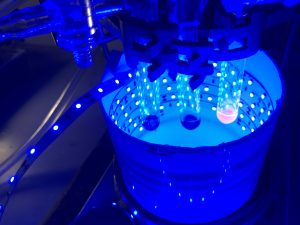
Photochemical reactions irradiated with blue light
How does being part of the Green Chemicals Beacon help you to achieve your goals?
The Green Chemicals Beacon is an incredible team of people and scientists, and all of us share the same belief. We all trust that we can work together to improve how chemicals are produced and manufactured in order to minimise the global environmental impact on our world.
The generation of reactive chemical species (i.e. free radicals) is often key in chemical processes. These species are incredibly high in energy, and their generation often requires hazardous chemicals or extreme conditions (i.e. intense UV irradiation and high temperature/pressure). Our mission, as part of the Green Chemicals team, is to study how the inexhaustible energy of visible light can provide a more sustainable tool for the generation of these reactive species, and identify the chemical processes of tomorrow.
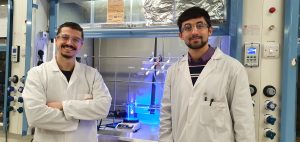
Mattia in the lab with his PhD student Dario
How does your research affect ordinary people?
We believe in target-focused, application-driven research. We are all well-aware of the significant impact that our daily activities have on our environment. As well as a substantial increase in the level of CO2 in our atmosphere, the increasing pollution and the overuse of natural resources are leading to a number of other severe issues. We believe that visible light photochemistry will provide more benign chemical processes for the synthesis of the materials, the agrochemicals and the pharmaceuticals of tomorrow and we are working for the development of novel processes in this field in order to secure a better future.
We also believe that visible light photochemistry has the potential to create molecules with unique biological properties, currently inaccessible with other conventional chemical processes. In this vein, we have recently established a collaboration with other researchers from the School of Pharmacy and the School of Medicine at the University of Nottingham with the aim of developing novel molecules with activity against cancer.
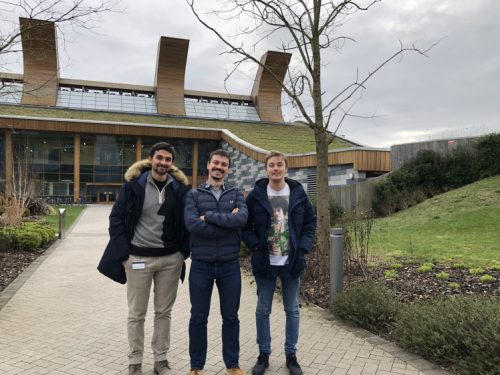
Mattia with his research team outside the GSK Carbon Neutral Laboratories for Sustainable Chemistry, home to the Silvi Research Group.
What current projects are you working on?
Synthetic chemistry lays at the heart of science and technology and has greatly enabled the development of important life-changing discoveries. For instance, the discovery of novel powerful medicines generally requires the study of a number of structural analogues of complex chemical structures. Traditionally, to construct these analogues, pairs of elementary molecular fragments are connected through a multi-step approach to enhance molecular complexity until the desired molecule is achieved (pretty much like we would do using a LEGO construction kit). However, the variety of structures accessible is generally limited by the reactions available to connect the elementary building blocks and the time/resources required to achieve the desired compound, defining strict boundaries to chemists’ imagination for the invention of novel bioactive molecules.
In contrast to traditional pair assembly chemistry, we are working on the development of a novel visible-light-driven process which allows the multi-component assembly of complex molecular fragments in a single chemical step. We believe that visible light photochemistry is an incredibly powerful tool, that will provide a reliable reactivity framework that will allow the rapid modification of complex bioactive molecules, generating myriad novel structural analogues for the creation of the pharmaceuticals of tomorrow.
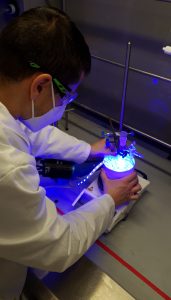
Mattia setting up a photochemical reaction
How has the pandemic affected your working day? Are you back in the labs or working from home?
COVID-19 has strongly impacted not only our everyday life but also the everyday life of our relatives, our parents and our loved ones. I am originally from Italy, and my country of origin was the first in Europe to be violently struck by this challenging virus, this significantly exposed me to how important it is to control of the spread of this disease. Thanks to dedicated teams at the University our safety has been guaranteed by a number of prompt actions, which has ranged from closing some of the laboratories and buildings to the increase of PPE for the laboratory work. We feel we are working in a very safe environment, although we are also aware that the virus is still there, and we need to keep our guard up.
We have recently resumed our work in the laboratory after a long lockdown period. My team is currently carrying out experimental work although at reduced working time and with the increased use of PPE (in addition to usual PPE we use facemasks and a combination of safety specs and glass visors). I work from home, as well as join the lab to support my students in the challenging tasks that every day organic chemists have to perform.
How did you become interested in science?
Chemistry has always fascinated me. I quickly realised that I had to follow my passion for chemistry during my time in high school. I remember that I was so interested in the subject that without studying or reading my notes I was able to remember every detail of the courses. This was far from being the case with other subjects I was less interested in.
When I was a kid I was also fascinated by chemical reactions, I loved to perform simple reactions at home, like creating CO2 from vinegar and bicarbonate. I remember of a few occasions in which my parents were not particularly happy with the outcome of my experiments especially when “chemicals” were spilt around the house! I have seen that nowadays on YouTube there are a number of videos describing experiments that can be performed at home. Luckily for my parents, YouTube did not exist at that time.
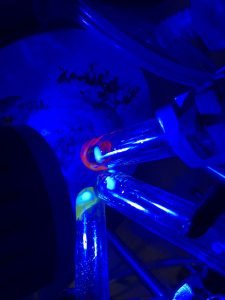
Colourful photochemical reactions at work.
Do you have any advice for young scientists?
My advice is to always chase your dreams with perseverance, this applies not only for science but also for art, music etc. Science is fascinating, but can be very frustrating from time to time as experiments do fail! Although we often picture scientists in their lab crying out “Eureka!” all the time, it is way more usual that our experiments fail rather than succeed. The reason for this is that we routinely challenge the unknown. There is a reason why it’s called “the unknown” because it is very challenging to discover!
What is your greatest career moment so far?
I have recently entered a new chapter of my career in Nottingham and started a research group with full independence and freedom. I have just been awarded a generous EPSRC grant that will secure resources for my group for the next few years. Therefore, I would say that this is the greatest career moment for me because these achievements mean that other people share my beliefs and trust in us as a research group. There is still a world to discover out there, and we can’t wait to keep challenging the unknown!
You can find out more about Mattia’s research as well as opportunities to work with his research team at The Silvi Research Group website.
To find out more about the Green Chemicals Beacon and how our team of researchers are working to secure the low carbon economy of the future, please visit the website or follow us on Twitter @UoN_GCB
No comments yet, fill out a comment to be the first

Leave a Reply